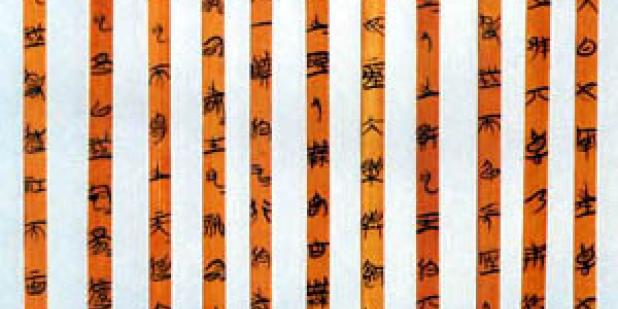Join us for a free one-day workshop for educators at the Japanese American National Museum, hosted by the USC U.S.-China Institute and the National Consortium for Teaching about Asia. This workshop will include a guided tour of the beloved exhibition Common Ground: The Heart of Community, slated to close permanently in January 2025. Following the tour, learn strategies for engaging students in the primary source artifacts, images, and documents found in JANM’s vast collection and discover classroom-ready resources to support teaching and learning about the Japanese American experience.
The Historical Meaning of the Guodian "Five Actions" (Wu Xing) and Its Authorship by Zisi and Mengzi
Professor Chen Lai from Peking University speaks at UCLA on the Guodian "Five Actions".

Monday, April 23, 2007
4:00 PM - 5:30 PM
UCLA 306 Royce Hall, Morris Seminar Room
Los Angeles, CA 90095
Sponsor(s): Center for Chinese Studies
Professor Chen will speak in Chinese.
Chen Lai, one of China's most prominent scholars of the history of Chinese philosophy, is a Professor of Philosophy at Peking University and the director of the Center for Confucian Study and the History of Chinese Philosophy at Peking University. Chen he received his Ph.D. from Peking University, where studied under Zhang Dainian and was a special assistant to famous scholar Feng Youlan (Fung Yu-lan). He has been named an honorary professor at eleven universities and is a member of the editorial boards of sixteen academic journals. He has been a scholar in residence at Harvard University and at universities in Japan, Hong Kong and Taiwan. Professor Chen has published 15 books and 260 essays. His current research is on Confucianism/Neo-Confucianism and the recently uncovered Guodian bamboo strips.
Regarding the Guodian texts, the Harvard Gazette had the following to say:
Near a river in Guodian, China, not far from a farmhouse made of earth and thatched with straw, Chinese archaeologists in 1993 discovered a tomb dating back to the fourth century B.C. The tomb was just slightly larger than the coffin and stone sarcophagus within. Scattered on the floor were bamboo strips, wide as a pencil, and up to twice as long.
On closer scrutiny, scholars realized they had found something remarkable. "This is like the discovery of the Dead Sea Scrolls," says Tu Weiming, director of the Harvard Yenching Institute. . . ." The 800 bamboo strips bear roughly 10,000 Chinese characters; approximately one-tenth of those characters comprise part of the oldest extant version of the Tao Te Ching (Daodejing), a foundational text by the Daoist philosopher Laozi, who may have lived in the sixth century B.C. The remaining nine-tenths of the writings appear to be written by Confucian disciples, including Confucius' grandson Zisi, in the first generation after Confucius' death. (Confucius lived from 551 to 479 B.C.) These texts amplify scholars' understanding of how the Confucian philosophical tradition evolved between Confucius' time and that of Mencius, a key Confucian thinker who lived in the third century B.C.
For more information please contact
Richard Gunde
Tel: 310 825-8683
gunde@ucla.edu
Featured Articles
Please join us for the Grad Mixer! Hosted by USC Annenberg Office of International Affairs, Enjoy food, drink and conversation with fellow students across USC Annenberg. Graduate students from any field are welcome to join, so it is a great opportunity to meet fellow students with IR/foreign policy-related research topics and interests.
RSVP link: https://forms.gle/1zer188RE9dCS6Ho6
Events
Hosted by USC Annenberg Office of International Affairs, enjoy food, drink and conversation with fellow international students.
Join us for an in-person conversation on Thursday, November 7th at 4pm with author David M. Lampton as he discusses his new book, Living U.S.-China Relations: From Cold War to Cold War. The book examines the history of U.S.-China relations across eight U.S. presidential administrations.




